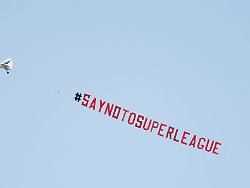Tuesday, April 20, 2021
The main thing is that the money flows
Super League as a playground for investors
The European Super League is a playground for investors – not least from the USA. Your interests are clear: lots of money, with as little risk as possible. The Americans, meanwhile, can only marvel at the emotional reactions in. Because they regulate such things differently themselves.
It is no coincidence that the plans for the new Super League were first unveiled in New York. There is the JP Morgan bank, which initially wants to finance this new playground with 3.5 billion euros. There, in the USA, there are also those entrepreneurs who, with their football companies in Europe, want to make as much money as possible with as little risk as possible. A Super League with guaranteed participation and guaranteed cash flow suits them there.
The European competitions must seem like a bad joke, especially to investors from the USA: Conditions for participation? Is regulated with money in North America. And that’s why there is no descent. A man like Stan Kroenke, who mostly owns Arsenal FC, doesn’t even invest 2.4 billion dollars in a new stadium in Los Angeles or afford clubs like the Los Angeles Rams (football) or the Colorado Avalanche (ice hockey).
For the marketing expert Dennis Trautwein from the globally operating Octagon agency, it is therefore no coincidence that the main financier and major investors come from the USA. A sports league as a closed system with a guaranteed income – this business model, as it was intended for the Super League, has “proven itself” there, he said. And the Super League would be a “global product that would also work commercially”.
“Great proximity” to US sports
That would, of course, be in the spirit of Kroenke, the rich bosses of the Fenway Group from Boston, who own Liverpool FC in addition to the traditional baseball club Red Sox, or the Glazer family who, in addition to the Super Bowl champion Tampa Bay Buccaneers, also Manchester United are among their property. It is understandable for Trautwein that six clubs from England are among the founders of the Super League: The English market is “very close” to US sport.
Basically, Trautwein sees the Super League as an opportunity to function globally. Football fans “in the other markets would certainly appreciate that,” he believes. “They also don’t have the close ties that exist in the clubs’ home markets.” As the person in charge of the renegade clubs, the rejection of the supporters in his home market would also cause him “worries, because it affects the soul of the clubs”. But for US investors, it’s about money. For your money.
It is not much different with the renegades from Italy and Spain, especially given the effects of the corona pandemic. Juventus Turin recently recorded a debt of 358 million euros and threatens to miss out on participation in the Champions League. AC Milan is owned by an investment company from, yes, the US. At local rivals Inter, an Indonesian is in charge. At FC Barcelona, on the other hand, the bad guys are said to amount to more than a billion euros, Real Madrid also has problems.
Trautwein sees the founding of the Super League primarily as a “power move”, as a strategic decision by the twelve clubs in connection with the reform of the Champions League. “These clubs want to make sure they get more of the pie.” The Super League is a means of exerting pressure, but, says Trautwein: “With the best of intentions I can’t imagine that this construct will be brought to life.”
.
